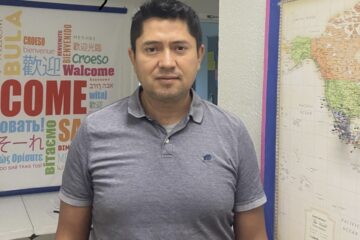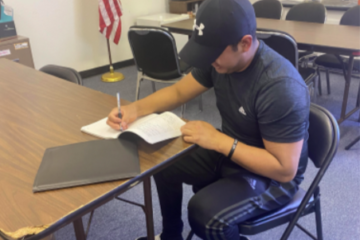Immigrant Stories: Melissa Dávila
Published by Program Manager on
Immigrant Stories: Melissa Dávila
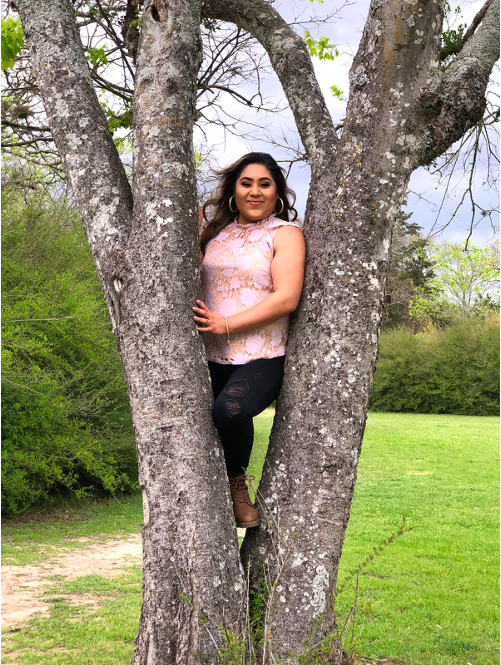
Adults who study English as a second language, at BIIN and elsewhere, do so for many different reasons. Some are preparing for the naturalization exam. Some want to speak better English to improve their job prospects or to be able to help their children with schoolwork. Many realize that they and their families will have better opportunities if they can communicate in more than one language. Regardless of their motivations, each adult learner brings something unique to the class. By hearing the stories of those who participate in BIIN’s programs, we can see the many ways in which the organization impacts the lives of those whom it serves.
Melissa Dávila is a relatively new participant in the English Conversation classes offered by BIIN, as she has taken part in them only since January 2021. A native of the state of Zacatecas, Mexico, Melissa came to central Texas in hopes of improving her English by interacting with native speakers. Her life back home, as she describes it, is actually quite happy and comfortable: both of her parents work, and she has trained to be a dentist. She had studied English over the years, and participated in a university language exchange program involving American students. That experience helped her see how much more she could learn by communicating with native speakers of English, both in and beyond the classroom.
Melissa wants to gain fluency in English both for personal reasons and because she believes this skill will be helpful in her career as a dentist. Through family connections, she was able to come to the U.S., knowing she had a place to stay and part-time work to cover her expenses. Soon after she arrived in Bryan, a family friend told her about BIIN, and Melissa promptly signed up for the English Conversation classes.
Her enthusiasm for the classes she attends every Monday and Wednesday evening is evident from the moment Melissa starts to speak: “I love these classes! The teachers and volunteers — Maestra Susan, Jake, and the others — they are so helpful! Students can ask any questions we have, and they always make sure we understand. Every time, I learn something that I can use in my daily life!”
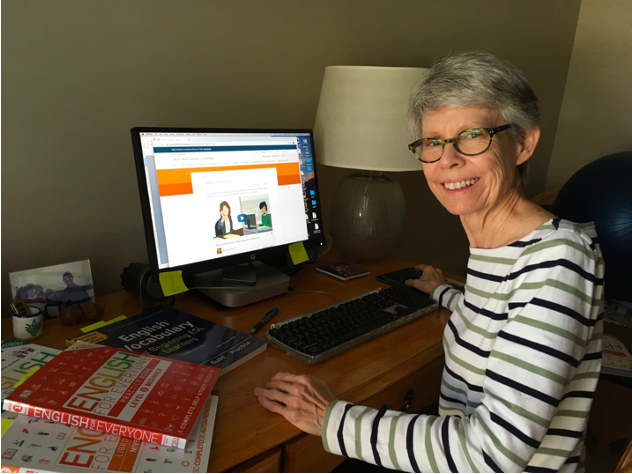
Long-time volunteer Susan Dennis devotes hours each week to preparing lessons and coaching other volunteers who have taken responsibility for leading sections for each level of the English Conversation classes.
Melissa is well aware of how hard it can be for people to learn a new language as an adult: “In the beginning,” she observes, “all of us students were timid, especially to speak English. No one wanted to make a mistake.” But feeling encouraged by the teachers and volunteers, the students gradually lost their reserve: “The teachers and volunteers are extraordinary! They are patient and they explain things well. They are always ready to help us, to answer our many questions. I can see that with time, our fluency is growing and our timidity is disappearing. We are not as afraid of making mistakes. It’s wonderful to see that we are really ‘in tune’ with each other!”
What contributes to this growing confidence and sense of community, as they work together in English? From Melissa’s perspective, the attitude and attention of the teachers and volunteers are fundamental: “What’s most helpful is when we have a question and they show us examples of ways that English is used. Or if they ask us to read something or answer a question, they help us with the correct pronunciation. They give us lots of opportunities to hear and use English. There is a lot of listening, repeating, and speaking.” Melissa also finds it helpful that after teachers introduce new material, students and volunteers go into breakout rooms and take time to practice using what they have just learned. While she wishes that it were possible to have in-person classes, she is grateful for the online classes and thinks the teachers and volunteers make good use of the features of Zoom to support instruction.
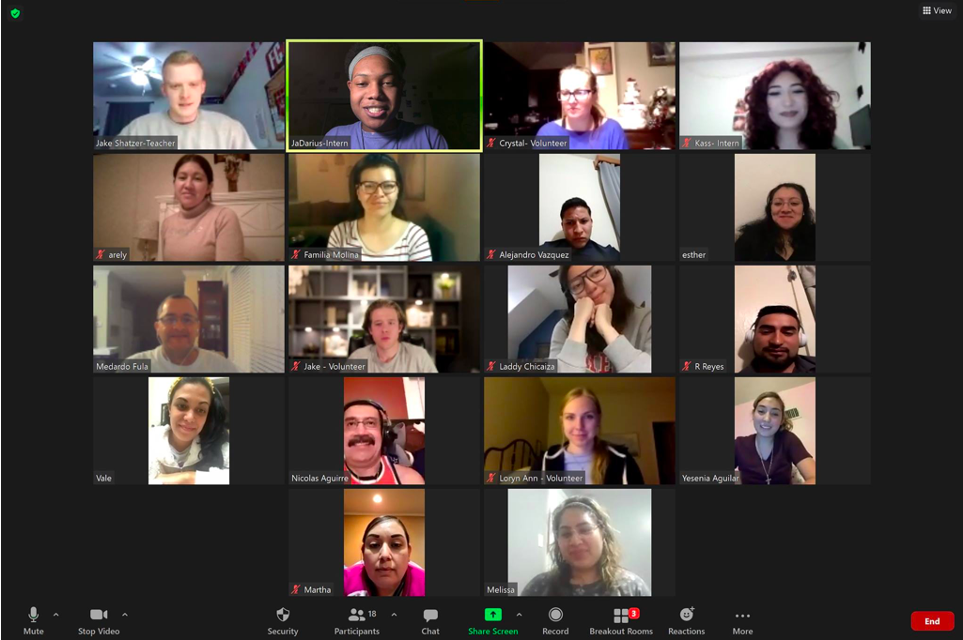
Teacher Jake Shatzer, a long-time volunteer with the program, along with interns JaDarius Jones and Kass Renteria, a crew of loyal volunteers and committed students come together on Zoom, forming a lively learning community.
Melissa has thought about what it takes to learn a second language as an adult, and points to a few strategies that have made a difference for her. “You need time to listen and to practice using it,” she states firmly. “So I listen to music in English and do other things to practice. I always practice saying things in daily life — for example, when I go shopping or when I’m at the restaurant where I work, I try to speak English whenever I can. I’ve also become more aware of the importance of pronunciation.”
Melissa thoroughly enjoys the lessons provided in the twice-weekly classes, but she knows she needs to take advantage of every possible opportunity to use English outside of class as well. Here are some of the things she does on her own, to keep building her skills:
- She uses an app on her phone to practice English vocabulary.
- She does exercises in the workbook that goes with the textbook used in class.
- She listens to songs in English, and looks up unfamiliar words on the internet.
- She reads in English, even short things like a paragraph in a magazine or labels on products.
- She turns on the subtitles when she watches films. Initially, she had the audio in Spanish and subtitles in English, but now, she has both audio and subtitles in English!
- She takes part in conversations in English, knowing that the more she tries, the easier it will be to understand what others say and to express herself.
As you can see, Melissa is really committed to making the most of her time in the U.S. She will resume her work towards a dental specialization in Mexico in the fall, but wants to continue participating in BIIN’s English Conversation classes for as long as she can.
Initially, all that Melissa knew about BIIN was that it offered free classes in English and in preparation for the citizenship exam. But gradually, she has learned about other services that BIIN offers, such as the IRA program and the BIIN CARES Fund. She has been very impressed by the sense of solidarity and the genuine welcome that the organization offers to immigrants in the Brazos Valley. “I think this is very important for Latinos,” Melissa observes. “Most of them come to the U.S. with the dream of having a better way of life for their families. Compared with Mexico, the U.S. has a lot of ways to help people.”

Melissa is a fan of Instagram, and thinks that BIIN should continue to use social media to make sure that people in the community know about all of the services that it offers. She encourages others to take advantage of BIIN’s programs, by emphasizing the quality and trustworthiness of the people involved: “I want people to know that the people who teach and volunteer at BIIN are extraordinary! They are people who you can count on!”
Melissa appreciates the many different opportunities that BIIN provides to immigrants, but she thinks that the chance to learn English is potentially the most consequential gift of all. She feels particularly indebted to the teachers and volunteers who make the English Conversation classes possible: “I want to thank them for the encouragement and support they give to us. I want them to know that we will always be grateful to them for helping us learn a language, for that is something that will help us throughout our lives!”
Thank you, Melissa, for bringing your energy and enthusiasm to the BIIN community, for sharing your story and strategies with us, and for helping us recognize the true gift that it is: to be able to listen, understand, speak and be understood, in a language that we did not absorb as a child but instead must work hard, day after day, to learn. Along with your classmates and teachers, you too are extraordinary!

